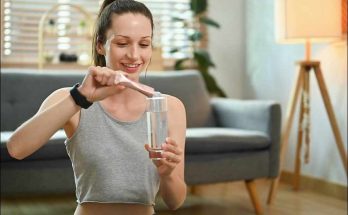The more you exercise, the more you need to eat a balanced diet. The nutritional rules still apply, but with an added carbohydrate intake. The combination of healthy food and physical exertion combats stress, encourages tissue repair, rebalances hormones and releases endorphins and encephalin. Mood and outlook should improve markedly.
To boost your sporting performance, you need glucose. The body makes glucose from starches and sugars in carbohydrates, including bread, potatoes and rice and stores it in the muscles and liver as glycogen. Like everyone else, sportspeople need protein, obtained mostly from pulses, poultry, red meat, fish, cheese, eggs and seeds, and vitamins, minerals and essential fatty acids. Sufficient fluids, particularly in advance of sport, are vital. You should also drink water during (if possible) and after exercise to replenish fluids.
The more you train, the more you need to eat a balanced diet. The dietary rules still apply, but with an added carbohydrate intake. The combination of healthy eating and physical stress of fighting effort, promotes tissue repair, rebalance hormones and releases endorphins and enkephalins. Mood and outlook should improve significantly.
To improve your sports performance, you need glucose. The body makes glucose from starches and sugars in carbohydrates, including bread, potatoes and rice and stores in muscles and liver as glycogen. Like everyone else, need protein Sport, made mainly from pulses, poultry, red meat, fish, cheese, eggs and grains, and vitamins, minerals and essential fatty acids. adequate liquid, especially in advance of the sport, are essential. You should also drink water during (if possible) and after exercise to replenish fluids.
If an intense exercise and fitness are an integral part of your life, you need to think long term and always stick to a balanced input, but varied food. Most athletes have a hearty breakfast and nutritious, especially the day of the event, and eat a diet rich in complex carbohydrates permanent.
Scaling Up Carbohydrats
Current recommendations for athletes is to get a maximum of two thirds, or 67 percent of their energy requirements from complex carbohydrates. The more glycogen the body can store, energy in the longer term it has to put in sustained exercise. Glycogen is the main fuel that muscles use to move. Rice, pasta, potatoes, pulses and seeds are rich in complex carbohydrates, which are converted into glycogen.
Aim to get 10-15 percent of calories from protein, 20-30 percent fat and the remainder from complex carbohydrates. Remember that low fat does not mean fat free – you need essential fatty acids. Your fat intake is the best gleaned mainly from vegetable oils, fatty fish and nuts and partly from dairy products, with a limited intake of red meat to keep your saturated fat intake down.
Normal Protein Intake
In the past, nutritionists recommend a protein supplement to boost energy during sports training. However, 1 g carbohydrate, 1 g protein to generate the same number of calories – four – and a diet high in protein can the body produce too much acid. To counter the effects of acidity, the body uses its supply of sodium and calcium (which is alkaline), contributions from such high protein intake can have serious repercussions on the levels of calcium. In turn, this can lead to osteoporosis, a disease that weakens bones.
Vitamins and Minerals
If you participate in sports that burns high levels of energy, make sure you get vital nutrients from your diet.
Choose foods containing vitamin B1 (or thiamine), such as fortified breakfast cereals, porridge, muesli, potatoes, nuts and legumes, to help digestion and good muscle function.
Vitamin B6 (or pyridoxine), found in lean meat, fish, eggs, yeast extract and soya beans, helps prevent anemia and muscle spasms or cramps.
Potassium in avocados, fresh and dried fruits – particularly bananas – mushrooms and potatoes regulates muscle function and body fluid levels.
Magnesium contributes to the functioning of nerves and muscles to choose green vegetables, sesame seeds, wheat germ, legumes and nuts.
Zinc is constantly lost through sweat and blood. To counter this, you can eat mollusks, red meat, peanuts and sunflower seeds.
Foods rich in vitamins A, C and E dairy products, such as fatty fish (herring and sardines), vegetable oils, citrus, potatoes and green and red vegetables help your body to use oxygen effectively.
Some athletes regularly take vitamin and mineral supplements to improve their performance. It is not necessary to exceed the recommended daily intake – it is much better to get the nutrients needed for strength, endurance and flexibility of a healthy diet.
Sports Drinks – Good or Bad?
Many “isotonic” sports drinks claim to rehydrate and re-energized, but any product containing calories will increase your energy level. The best way to obtain calories is the complex carbohydrates found in bread, potatoes, rice, pasta and cereals. In fact, less satisfactorily in terms of nutritional eating simple carbohydrates – that is, sugar. However, many sports drinks contain large amounts of sugar – in some cases up to 18 percent. In addition, as sugary drinks are bad for teeth and potentially dangerous for diabetics.
Sports drinks also contain caffeine, as well as additives to improve color, flavor, softness and stability. Although it may give a sense of instant energy, caffeine can act as a diuretic and it is more likely that dehydration rehydrate. The additives contribute nothing to performance, even if they can make the product more attractive.
The drink rehydration is the most effective combination of fruit juice and water with a pinch of salt. For a rapid rise in energy snack of fruit, like banana or dried apricots.
Views: 413





